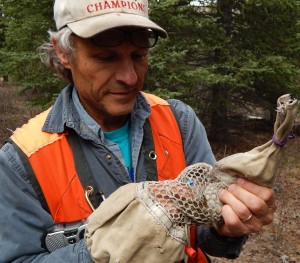Dr. Stan Boutin, University of Alberta.
My research i nvestigates how resource availability affects maternal investment, development of offspring, and lifetime reproductive success in boreal mammals. I wish to determine how individual behavioral and life history responses to current conditions are shaped by past conditions and future trade-offs. For over 25 years my students and I have used field studies of individual red squirrels and experimental manipulation of their environment to investigate these questions.
nvestigates how resource availability affects maternal investment, development of offspring, and lifetime reproductive success in boreal mammals. I wish to determine how individual behavioral and life history responses to current conditions are shaped by past conditions and future trade-offs. For over 25 years my students and I have used field studies of individual red squirrels and experimental manipulation of their environment to investigate these questions.
Dr. Ben Dantzer, University of Michigan
 My research focuses on questions that integrate animal behavior, physiology, and evolutionary ecology. I am interested in understanding the factors shaping the evolution of behavioral and life history traits as well as how physiological traits both mediate but also constrain variation in life history and behavioral traits. In red squirrels, I study the mechanisms and evolutionary consequences of early life experiences among other questions. I use a combination of long-term data coupled with large-scale experimental manipulations and laboratory analyses to address my research questions.
My research focuses on questions that integrate animal behavior, physiology, and evolutionary ecology. I am interested in understanding the factors shaping the evolution of behavioral and life history traits as well as how physiological traits both mediate but also constrain variation in life history and behavioral traits. In red squirrels, I study the mechanisms and evolutionary consequences of early life experiences among other questions. I use a combination of long-term data coupled with large-scale experimental manipulations and laboratory analyses to address my research questions.
Dr. Murray M. Humphries, McGill University.
My research focuses on the behavior and physiology of red squ irrels, in particular how they acquire energy through feeding and food hoarding and how they expend energy through activity, thermoregulation, and reproduction. In collaboration with John Speakman, University of Aberdeen, I make extensive use of the doubly labeled water technique to measure the energy expenditure of free-ranging individuals. I also use flow through respirometry to obtain systematic measures of resting metabolic rate and thermal conductance of individuals in the population.
irrels, in particular how they acquire energy through feeding and food hoarding and how they expend energy through activity, thermoregulation, and reproduction. In collaboration with John Speakman, University of Aberdeen, I make extensive use of the doubly labeled water technique to measure the energy expenditure of free-ranging individuals. I also use flow through respirometry to obtain systematic measures of resting metabolic rate and thermal conductance of individuals in the population.
Dr. Jeff Lane, University of Saskatchewan
 I’m interested in the ways in which individuals and populations respond to short- and long-term variation in their natural environments. I combine theory and techniques from ecology, evolutionary biology, quantitative genetics and physiology to meet this challenge, and primarily work with wild mammal populations that have been studied for multiple decades. Red squirrels are an ideal study system in this sense, because we can track individuals across their entire lives, scale our individual data up to population-level metrics and quantify their primary food resource (white spruce seed).
I’m interested in the ways in which individuals and populations respond to short- and long-term variation in their natural environments. I combine theory and techniques from ecology, evolutionary biology, quantitative genetics and physiology to meet this challenge, and primarily work with wild mammal populations that have been studied for multiple decades. Red squirrels are an ideal study system in this sense, because we can track individuals across their entire lives, scale our individual data up to population-level metrics and quantify their primary food resource (white spruce seed).
Dr. Andrew G. McAdam, University of Guelph.
I am i nterested in the interactions between ecology and contemporary adaptation. I use long-term pedigrees and experimental manipulations of resources and relatedness to quantify key ecological and quantitative genetic parameters. The goal of these investigations is to understand how an organism’s unique ecology contributes to contemporary patterns of selection and evolution.
nterested in the interactions between ecology and contemporary adaptation. I use long-term pedigrees and experimental manipulations of resources and relatedness to quantify key ecological and quantitative genetic parameters. The goal of these investigations is to understand how an organism’s unique ecology contributes to contemporary patterns of selection and evolution.
